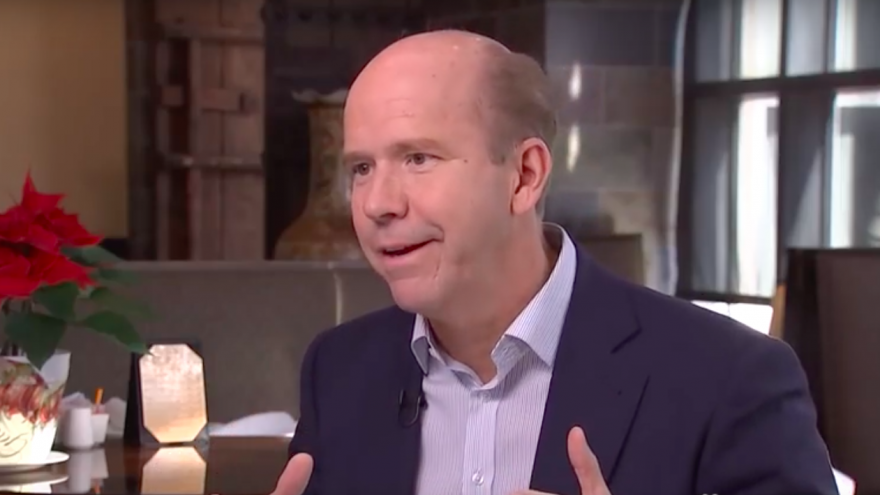Former Maryland Rep. John Delaney was the first Democrat to officially enter the 2020 presidential race.
As he was known to be a steadfast three-term bipartisan congressman, his record on Israel was essentially such—bipartisan on most accounts, which included supporting the two-state solution between the Israelis and the Palestinians.
“Israel is not just another foreign-policy issue; it is a huge part of the daily spiritual lives of millions of Americans, and there is an intense mutual bond between the two nations,” said Rabbi Stuart Weinblatt, founder of the B’nai Tzedek Congregation in Potomac, Md. “With regional stability faltering and threats to Israel increasing, John Delaney’s visit to Israel couldn’t come at a better time.”
In November 2014, Delaney condemned a Palestinian terrorist attack on a synagogue in Jerusalem’s Har Nof neighborhood that left four rabbis brutally murdered, with a responding Druze police officer later dying of his wounds, and injured seven male worshippers.
“The murdering of innocent people gathered to pray is an affront to civilization,” continued Delaney. “However, we know that this act of terrorism will only strengthen the resolve of the Israeli people and the bond between our two countries. This attack is a sobering reminder of the importance of a robust war on terrorism and the need for all parties in the region to respect Israel’s right to exist.”
Delaney’s record on supporting sanctions against Iran was mixed.
Despite his support for sanctions against Iran, Delaney supported the 2015 Iran nuclear deal, which lifted U.S. financial penalties against the regime.
“I hate to second guess negotiators, but this job requires me to do that. I view the [agreement] as a poorly negotiated deal on balance,” he said in a statement. “And while I would like to ‘put the toothpaste back in the tube’ and have another cut at getting a better deal for the American people and our ally Israel, I have concluded that this is impossible to do, particularly since the Senate failed to pass their resolution of disapproval, so I voted to approve the deal.”
In that same statement, however, Delaney called for the military option “if Iran takes steps to get a nuclear bomb.”
Although Delaney called for tougher sanctions on the Islamic Republic in January 2016, he voted against the Iran Accountability Act the following July. The bill would have slapped financial penalties against Iran’s Revolutionary Guard Corps and those tied to it, Mahan Air, the regime’s support for terrorism and money laundering, its human-rights abuses, among other issues related to Iranian activity.
Nonetheless, he voted for Iran sanctions in July 2017 that became law.
Delaney slammed U.S. President Donald Trump for withdrawing the United States from the deal in May 2018.
“THIS is why Putin helped Trump campaign—he knew Trump is untrustworthy & would back out of our global engagements (TPP, Paris, Iran) & diminish our leadership in the world,” he tweeted. “Pulling back from our global leadership position is bad for our economy & [national security].”
[tweet id=”993885231836028929″]
Delaney was also critical of anti-Israel bias at the United Nations.
In November 2016, he wrote an op-ed, slamming the previous month’s two UNESCO resolutions that ignored Jewish and Christian connections to Jerusalem. For example, it referred to Jerusalem’s Temple Mount just by its Muslim names, Al-Aqsa Mosque and Al-Haram Al-Sharif.
“The UNESCO resolutions are just the most recent example of countries using the United Nations to undermine Jewish history and allow anti-Israel activism. We should be discussing how to make the world a safer place, but yet we have to constantly defend established and indisputable history,” he wrote in Washington Jewish Week. “If we truly want a peaceful resolution to the ongoing conflict, we should stop voting on one-sided resolutions that have no basis in reality and instead focus on direct bilateral negotiations between Israel and the Palestinians.”
In response to the United States abstaining from U.N. Security Resolution 2334 in December 2016, condemning Israeli neighborhoods in Judea and Samaria, thereby allowing it to pass, he co-sponsored a House resolution rebuking the vote.
“Israel is our closest ally in the Middle East, a vital partner in fighting terrorism and a nation that shares our core values. U.N. Security Council Resolution 2334 is a one-sided, anti-Israel measure that does not serve the interests of peace, security or human rights in the region,” he said in a statement.
“I am particularly disturbed that this U.N.S.C. Resolution defines Israeli presence in Jerusalem and at the Western Wall as illegal, potentially limiting access to the most sacred place for Jews around the world,” he continued. “I continue to believe that we need a fair two-state solution and do not support efforts to expand settlements in the West Bank. However, this U.N.S.C. Resolution goes much too far. We will never see peace in the region achieved by one-sided measures led by outside bodies, which is what this U.N.S.C. Resolution represents.”
One of Delaney’s last acts in Congress included signing onto a bipartisan letter in May 2018, calling on U.S. Secretary of State Mike Pompeo to name someone as Special Envoy to Monitor and Combat Anti-Semitism. (A bill to elevate the status of that position, in addition to requiring the president to fill it within 90 days of enactment, passed the House last week.)
“John Delaney is your typical Washington, D.C. politician who says one thing and does another,” said National Republican Congressional Committee spokesperson Camille Gallo in 2016. “If John Delaney really cares about keeping Israel safe, he wouldn’t have voted to make it easier for an anti-Israel country like Iran to acquire a nuclear weapon.”
How Delaney justifies his inconsistent record on Israel and Iran on the campaign trail remains to be seen.


























